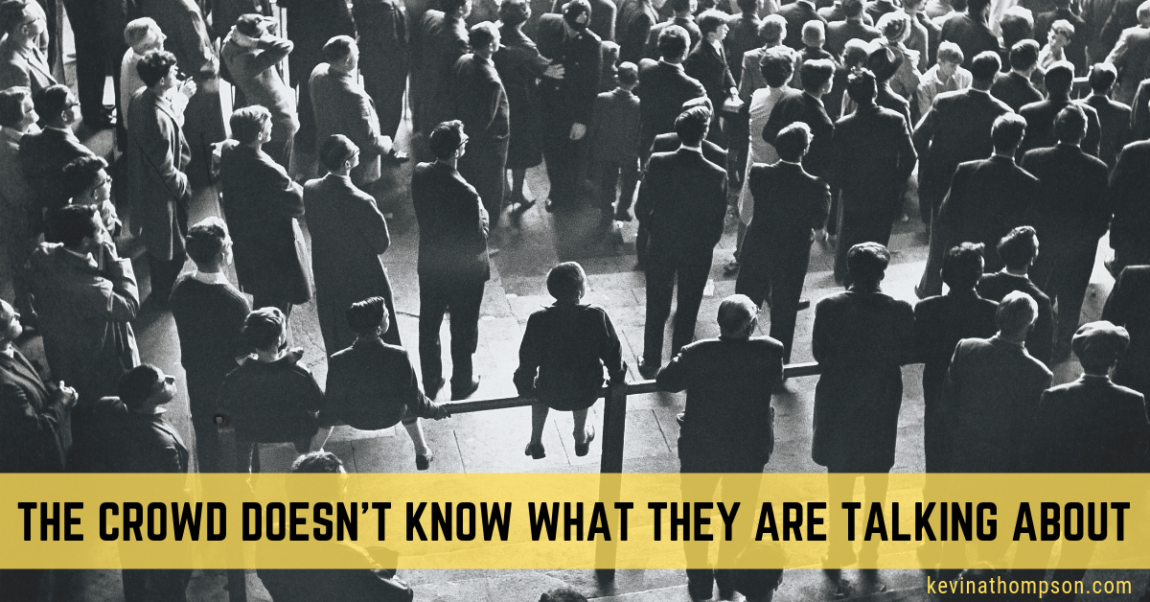Five of us are standing on the tee box. I pick my target, make solid contact, and send the ball exactly where I want it to go. My internal voice of “good shot” is quickly confirmed by three other voices vocalizing their agreement, “Well done.” “Good ball.” “Good shot.” All the accolades mask a major problem. The fifth voice on the tee box was silent. He never said a word. As we walked to my ball, I topped a hill and saw the problem. My ball was in a bunker hidden in the middle of the fairway.
Two holes later the scene reversed itself. As my tee shot flew through the air, three voices were silent. They thought the ball was in serious trouble. Yet one voice confidently said, “good shot.” As I continued to watch the ball with concern, the voice continued, “When I say good shot, you can pick your tee up and start walking. There is no need to keep watching it.” (See: My Opinion on Your Opinions)
This was an unusual round of golf for me and my friends. While we often play together, we never play with a professional caddie. Yet on this trip, and for this course, we weren’t carrying our own bags. Instead, a man who walks this course nearly 500 times a year was guiding us around a place that was new to us. This experience made his voice different. When it came to declaring a shot good or bad, his was the only voice that mattered. We hadn’t been here before. We didn’t know the hidden dangers or the probable places a ball could roll. This man was so experienced that within just a few holes he could tell you exactly how far each club in my bag could hit a ball. When he was silent, you were in trouble. When he said “good shot,” you could take it to the bank that the ball would end up in a good spot.
It didn’t take long for me to learn to ignore the declarations of my friends–they were just as ignorant as I was–and to fixate on the voice of the caddie. Because he had been there, he knew right from wrong.
Too often in life, we focus on the voice of the crowd. If a majority of people shout their approval, we assume we are alright. If a good number of people voice their disapproval, we assume something is wrong. Yet rarely is that the case. In nearly every area of life, the crowd is most often wrong. They don’t know what they are talking about. It’s not because they are intellectually slow or ill-intended. They aren’t trying to trick us. They are wrong because they do not have the knowledge and experience necessary to know what is right and to determine what is wrong. We should love them, but ignore them.
I see it as a writer. I poll several counselors to see a current threat to modern marriage. In response to their advice, I write THIS article. The crowd goes crazy. They question my intelligence, integrity, and heart. The experts say the problem is real, but the crowd doesn’t have the same experience.
I see it as a pastor. I talk about THIS issue. The crowd says pastors shouldn’t talk about those topics. They yell and scream that there should be a divide between my job and those issues. Yet the crowd hasn’t greatly studied the job description of a pastor. They don’t know this topic is more in line with my calling than maybe any other issue of our day. The voices are loud, but they aren’t necessarily right.
I see it as a leader. I write about THIS issue. The crowd says I’m just stirring the pot. They say I’m trying to use click-bait. What they don’t realize is I’m interacting with real people who are telling me their struggles. I’m not making things up; I’m giving voice to those who may not have it. The crowd might critique, but it’s the voices who are never heard actually speaking the truth.
It’s not just true in my life; it’s an accurate idea in the life of every person–the crowd is often wrong. They are wrong so often that we should never use a majority of voices as a determination of right and wrong. Instead, we should discern whose voices matter the most. We should then fixate on those voices.
For me, it means:
When I write about adultery, if a marriage counselor voices concern about what I’ve written, I should pay attention. But when others claim I’m being too rigid or fanatical, I should just keep on writing.
If a person of color ever claims I’m writing too much about racism, then maybe I should back off, but when a white person joins the chorus of saying “I’m just stirring the pot,” I should ignore them.
When a stranger or critic questions my heart, I shouldn’t give them too much credibility. But when a friend or family member who knows me doubts my intention, I should pay attention.
Everyone has an equal right to their opinions, but everyone’s opinion is not equal. Some voices matter more than others. Identify the ones that mean the most and then listen intently. Figure out the ones who don’t have the knowledge or experience desired and kindly ignore them.




2 Responses to The Crowd Doesn’t Know What They Are Talking About